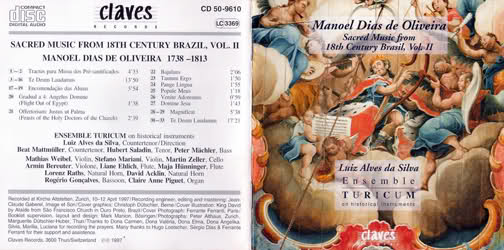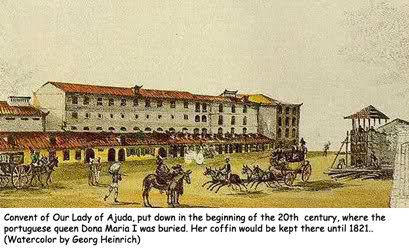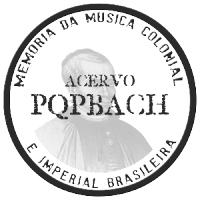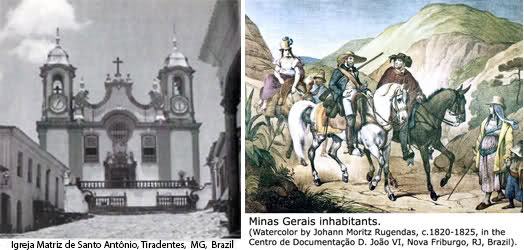 .Sacred Music From 18th. Century – vol. II
.Sacred Music From 18th. Century – vol. II
Manoel Dias de Oliveira was born in São João del Rey (today Tiradentes) in 1738. There is nothing to indicate that he made any trips or had any contact with other composers in the territory of Minas Gerais throughout his long life. He reached the peak of his music career (he was also an excellent copyist) in the last quarter of the 18th century. His compositions were very popular both within and beyond the so-called Campo das Vertentes and Vale do Rio das Mortes. Manoel Dias de Oliveira, together with José Joaquim Emerico Lobo de Mesquita and João de Deus de Castro Lobo, is one of the composers most frequently found in the Brazilian archives (even if many of the manuscripts attributed to him are of doubtful authenticity).
Already as a young boy he was very attracted to the music performed in the cathedral of Santo Antonio. He had memorized the different voices of the traditional repertoire, and he learned new works very quickly. He hid himself in the church in order to secretly listen to the music rehearsals. The story is told that Pater Francisco da Piedade, as he was crossing the courtyard, was amazed to hear the young mulatto singing parts of a composition by Josquin while playing with the ants. The priest immediately invited the boy to join the choir and gave him the opportunity to study theory, counterpoint and organ. ln order to earn a little money, Oliveira began to work as a music copyist, quickly earning a reputation in this field. Details about his life are very scant. He was a member of the Ordem Terceira de São Francisco fraternity, and he received the title of Capitão da Cavalaria a pé [captain of the foot cavalry] from Portugal’s Queen Maria l (this was the highest title that someone with his skin color could receive). The corresponding document can be found in the Torre do Tombo archives in Portugal.
The following death certificate is in the archives of the cathedral in Tiradentes: Capitão Manoel Dias de Oliveira died, after having received all the sacraments, of a chest affliction on the twelfth day of the month of August in the year 1873. [He was] dark-skinned, married to Anna Hilairia, a master of music composition, a member of the order of the Holy Franciscans. The funeral service with the last sacraments was celebrated by priests with two music choirs on the 21st of the same month, under the patronage of his eminence the Coadjutor Bonifacio Barbosa Martins. Oliveira was buried in grave number two in the São João Evangelista Chapel. I have written and signed this document as testimony to these facts. Coadjutor Joao Miz. Lopes.
 The works of Manoel Dias de Oliveira are still performed in an unbroken tradition in the cities of Tiradentes, Prados and São João del Rey. Many of the compositions attributed to him are to be heard especially during the Holy Week. As was typical of the Portuguese-Neapolitan tradition, Brazilian liturgical music from the colonial times was frequently written for a trio antique ensemble (2 violins and basso continue). The majority of the works recorded here can definitely be ascribed to Oliveira, since the name of the Captain is noted on the title pages. The Te Deum with gregorian chant insertions, in fact, exists in two complete manuscript copies, one in the archives of the Associação de Canto Coral, and other in the Museu da Música da Curia Metropolitana de Mariana.
The works of Manoel Dias de Oliveira are still performed in an unbroken tradition in the cities of Tiradentes, Prados and São João del Rey. Many of the compositions attributed to him are to be heard especially during the Holy Week. As was typical of the Portuguese-Neapolitan tradition, Brazilian liturgical music from the colonial times was frequently written for a trio antique ensemble (2 violins and basso continue). The majority of the works recorded here can definitely be ascribed to Oliveira, since the name of the Captain is noted on the title pages. The Te Deum with gregorian chant insertions, in fact, exists in two complete manuscript copies, one in the archives of the Associação de Canto Coral, and other in the Museu da Música da Curia Metropolitana de Mariana.
The Te Deum Laudamus that concludes this recording has been attributed to Oliveira on the basis of stylistic similarities, e.g., in comparison with his Magnificat (which is also on this recording). Regardless of the discussion surrounding the authorship of this work, it is without doubt a pleasure to listen to one of the finest compositions from Minas Gerais.
(Sérgio Dias – Sociedade Brasileira de Musicologia)
Manoel Dias de Oliveira (São José del Rey [Tiradentes], 1735-1813)
01. Tractus para Missa dos Pré-santificados – 1. Domine Audive
02. Tractus para Missa dos Pré-santificados – 2. Eripe me Domine
03. Te Deum Laudamus – 1. Te Deum/Te Dominum
04. Te Deum Laudamus – 2. Te æterneum/Tibi Omnes
05. Te Deum Laudamus – 3. Tibi Cherubim/Sanctus
06. Te Deum Laudamus – 4. Pleni sunt/Te gloriosus
07. Te Deum Laudamus – 5. Te prophetarum/Te Martirum
08. Te Deum Laudamus – 6. Te per orbem/Patrem immensæ
09. Te Deum Laudamus – 7. Venerandum/Sanctum quoque
10. Te Deum Laudamus – 8. Tu rex gloriæ
11. Te Deum Laudamus – 9. Tu ad liberandum/Tu devicto
12. Te Deum Laudamus – 10. Tu ad dexteram/Judex crederis
13. Te Deum Laudamus – 11. Æterna fac/Salvum fac
14. Te Deum Laudamus – 12. Et reges eos/Per singulos dies
15. Te Deum Laudamus – 13. Et laudamus/Dignare Domine
16. Te Deum Laudamus – 14. Miserere/Fiat misericordia
17. Encomendação das Almas – 1. Alerta mortaes
18. Encomendação das Almas – 2. Padre Nosso/Ave Maria
19. Encomendação das Almas – 3. Senhor Deus
20. Gradual a 4 – Angelus Domine (Flight Out of Egypt)
21. Offertorium ”Justus ut Palma”
22. Moteto “Bajulans”
23. Tantum Ergo
24. Pange Lingua
25. Popule Meus
26. Venite Adoremus
27. Domine Jesu
28. Magnificat – 1. Magnificat
29. Magnificat – 2. Gloria/Amen
30. Te Deum Laudamus – 1. TeDeum
31. Te Deum Laudamus – 2. Te ergo quæsumus
32. Te Deum Laudamus – 3. Æterna fac
33. Te Deum Laudamus – 4. Non confundar
Sacred Music From 18th. Century Brazil – Vol. II – 1997
Ensemble Turicum
Countertenor & Direction: Luiz Alves da Silva
Recorded at Kirche Altstetten, Zurich, 10-12 April 1997
Imagens retiradas do site www.josemauricio.com.br
.
(Especiais agradecimentos ao nosso ouvinte Jorge Tadeu pela preciosa colaboração. Digitalizou com esmero o encarte.)
.
 BAIXE AQUI – DOWNLOAD HERE
BAIXE AQUI – DOWNLOAD HERE
XLD RIP | FLAC 297,5 MB
.
BAIXE AQUI – DOWNLOAD HERE
MP3 320 kbps – 149,3 MB – 1 hora
powered by iTunes 12.1.0
.
Boa audição!
Avicenna

Olá!!
Foi um prazer contribuir um pouco com esse blog que trabalha tanto pela divulgação de nossa música!!!
Parabéns Avicenna, este CD é imperdível.
Um abraço a todos!!
FELIZ 2010!! SUCESSO, SAÚDE, PAZ, DINHEIRO……E MUITA MÚSICA!!!!!!!!
ATÉ MAIS!!!!
Olá Avicenna!
Mais um belo trabalho do Ensemble Turicum. Bem que você disse que a música deles é de grande qualidade.
E por falar em qualidade, o minerinho caprichou na digitalização do encarte!
Bom ano a você também Jorge Tadeu!
Olá!!! Espero que 2010 tenha chegado em boa forma!!!!
Obrigado, Adriano. Pra vc tb.
Um grande abraço!!!!
Obrigado, mais uma vez.
Mas, não consigo descomprimir os ficheiros rar. Será problema do meu computador, ou é problema dos ficheiros em si?
Resolveu o seu problema, Siegfried?
Não. Talvez seja alguma coisa do meu software.
Obrigado, Avicenna, por mais esse barroco de qualidade. Acabei de baixar e ouvir.
A catedral da foto fica em Tiradentes e não em Sao João Del Rey.
A foto em questão é da Igreja Matriz de Santo Antônio e fica em Tiradentes MG. Lá não existe Catedral!!!!
Um grande abraço!!
Obrigado, Daniel e Jorge Tadeu!
Agora o texto está correto!
Um abraço,
Avicenna
Dear Avicenna
You put me in such a dilemma….The compositions are divine and meet 100% my ideal taste of music, BUT: this castrato parts are so terrible. I tried to force myself to “like” it and hear it with the most good-willing ears. I’ve lost, I am afraid I just can’t get used to this countertenor timbre, no matter how beautiful the piece of music is the countertenors try to distroy. I’m convinced if de Oliveira worked in other circumstances he would have used a soprano instead. What a pity and loss for me…..
Thanks anyway!
Jan
texto en inglés???
Feliz Año 2017
Thanks, Luisqui.
O encarte só veio com texto em inglês.
Avicenna
Bonjour.
Même problème de téléchargement avec le .flac que pour le vol 1 : le fichier a 27,18 mb seulement et non 297,5 mb. Le .mp3 est parfait.
Jet
:0)
Obrigado pelo aviso,Jet!
Agora está OK.
Avicenna